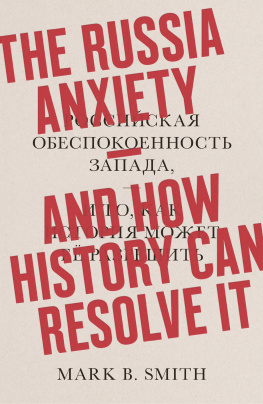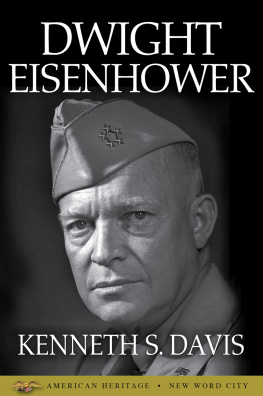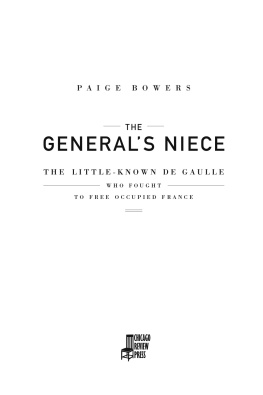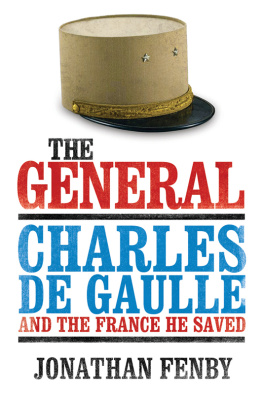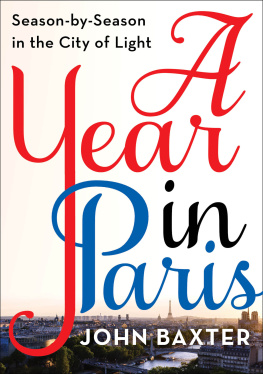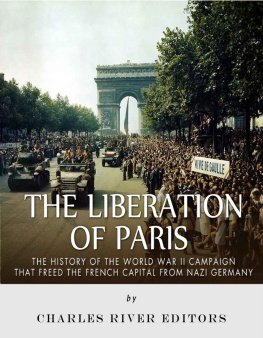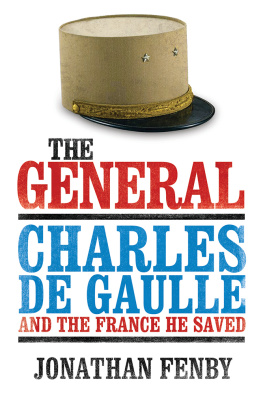Smith - Liberation of Paris: How Eisenhower, de Gaulle, and von Choltitz Saved the City of Light
Here you can read online Smith - Liberation of Paris: How Eisenhower, de Gaulle, and von Choltitz Saved the City of Light full text of the book (entire story) in english for free. Download pdf and epub, get meaning, cover and reviews about this ebook. year: 2019, publisher: Simon & Schuster, genre: History. Description of the work, (preface) as well as reviews are available. Best literature library LitArk.com created for fans of good reading and offers a wide selection of genres:
Romance novel
Science fiction
Adventure
Detective
Science
History
Home and family
Prose
Art
Politics
Computer
Non-fiction
Religion
Business
Children
Humor
Choose a favorite category and find really read worthwhile books. Enjoy immersion in the world of imagination, feel the emotions of the characters or learn something new for yourself, make an fascinating discovery.
- Book:Liberation of Paris: How Eisenhower, de Gaulle, and von Choltitz Saved the City of Light
- Author:
- Publisher:Simon & Schuster
- Genre:
- Year:2019
- Rating:5 / 5
- Favourites:Add to favourites
- Your mark:
- 100
- 1
- 2
- 3
- 4
- 5
Liberation of Paris: How Eisenhower, de Gaulle, and von Choltitz Saved the City of Light: summary, description and annotation
We offer to read an annotation, description, summary or preface (depends on what the author of the book "Liberation of Paris: How Eisenhower, de Gaulle, and von Choltitz Saved the City of Light" wrote himself). If you haven't found the necessary information about the book — write in the comments, we will try to find it.
Smith: author's other books
Who wrote Liberation of Paris: How Eisenhower, de Gaulle, and von Choltitz Saved the City of Light? Find out the surname, the name of the author of the book and a list of all author's works by series.
Liberation of Paris: How Eisenhower, de Gaulle, and von Choltitz Saved the City of Light — read online for free the complete book (whole text) full work
Below is the text of the book, divided by pages. System saving the place of the last page read, allows you to conveniently read the book "Liberation of Paris: How Eisenhower, de Gaulle, and von Choltitz Saved the City of Light" online for free, without having to search again every time where you left off. Put a bookmark, and you can go to the page where you finished reading at any time.
Font size:
Interval:
Bookmark:
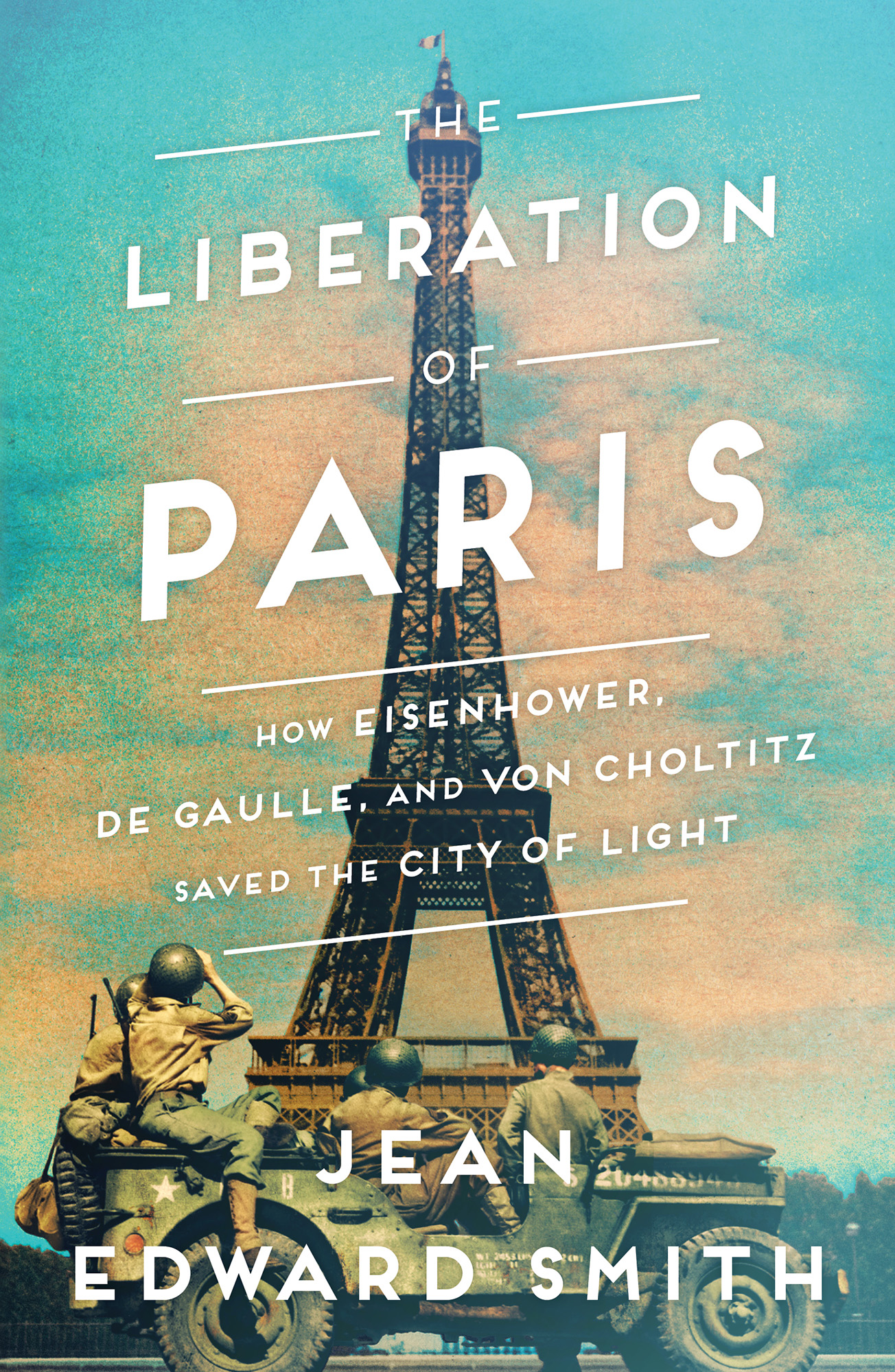
ALSO BY JEAN EDWARD SMITH
Bush
Eisenhower in War and Peace
FDR
Grant
John Marshall: Definer of a Nation
George Bushs War
Lucius D. Clay: An American Life
The Conduct of American Foreign Policy Debated
(ed., with Herbert M. Levine)
The Constitution and American Foreign Policy
Civil Liberties and Civil Rights Debated
(ed., with Herbert M. Levine)
The Papers of General Lucius D. Clay (ed.)
Germany Beyond the Wall
Der Weg ins Dilemma
The Defense of Berlin


Simon & Schuster
1230 Avenue of the Americas
New York, NY 10020
www.SimonandSchuster.com
Copyright 2019 by Jean Edward Smith
All rights reserved, including the right to reproduce this book or portions thereof in any form whatsoever. For information, address Simon & Schuster Subsidiary Rights Department, 1230 Avenue of the Americas, New York, NY 10020
First Simon & Schuster hardcover edition July 2019
SIMON & SCHUSTER and colophon are registered trademarks of Simon & Schuster, Inc.
For information about special discounts for bulk purchases, please contact Simon & Schuster Special Sales at 1-866-506-1949 or .
The Simon & Schuster Speakers Bureau can bring authors to your live event. For more information or to book an event, contact the Simon & Schuster Speakers Bureau at 1-866-248-3049 or visit our website at www.simonspeakers.com.
Library of Congress Cataloging-in-Publication Data
Jacket Design by David Litman
Jacket Photograph by American Photo Archive/Alamy Stock Photo
Names: Smith, Jean Edward, author. Title: The liberation of Paris : how Eisenhower, De Gaulle, and Von Choltitz saved the City of Light / Jean Edward Smith. Description: First Simon & Schuster hardcover edition. | New York : Simon & Schuster, 2019. | Simon & Schuster nonfiction original hardcover. | Includes bibliographical references and index. Identifiers: LCCN 2018036260| ISBN 9781501164927 | ISBN 1501164929 | ISBN 9781501164941 (ebook) Subjects: LCSH: Paris (France)--History--1940-1944. | France--History--German occupation, 1940-1945. | World War, 1939-1945--France--Paris. Classification: LCC D762.P3 S65 2019 | DDC 940.54/214361--dc23 LC record available at https://lccn.loc.gov/2018036260
ISBN 978-1-5011-6492-7
ISBN 978-1-5011-6494-1 (ebook)
For Christine
 I
I Paris Occupied
Paris OccupiedParis has always fascinated me. I could have marched at the head of my troops under the Arc de Triomphe; but I did not want, under any pretext, to inflict this humiliation on the French people after their defeat. I want no obstacle to this Franco-German entente, which will happen, I am sure.
ADOLF HITLER, PARIS, JUNE 28, 1940
G erman troops entered Paris in the early morning hours of June 14, 1940. There was no fighting, and no shots were exchanged. French general Maxime Weygand, the armys commander in chief, had declared Paris an open city, and it was not defended. On June 10, the French government had fled first to Tours, then to Bordeaux, and the army withdrew shortly afterward. Unlike World War I, in which the French army defended the approaches to Paris successfully in 1914 and again in 1918, this time the army withdrew without a fight. The French leadership recognized that the war was lost, and chose not to defend the capital city. Paris, with a population of four million and incomparable art treasures and historic monuments, became German territory overnight. General Fedor von Bock, commanding German Army Group B, held a quick review of his troops at the Place de la Concorde early on the morning of June 14, and then had breakfast at the Ritz.

General von Bock saluting his troops entering Paris, June 14, 1940
The beginnings of World War II, and the history of France preceding it, must be understood to appreciate the significance of the German occupation of Paris. After German forces invaded Poland on September 1, 1939, Britain and France, honoring their diplomatic obligations, declared war on Germany. That decision was not popular in France. There were no supportive demonstrations in Paris or other French cities when war came, no ringing declarations of the righteousness of the war or the evils of Hitlers regime. France mobilized an army of 2.6 million men. But they took up defensive positions, half on the Maginot Line, the other half on the Belgian border, ready to meet another German Schlieffen Plan that would outflank the French army by moving through Belgium, as in 1914. Many Frenchmen doubted the wisdom of the governments going to war. The French right admired Hitler and Nazi Germany. For them, the war was indefensible. The left, though they despised Nazi totalitarianism, did not want war with any country, because of a devotion to pacifism and a conviction, taught in public schools since 1919, that war was an evil to be avoided at all costs. Frances enormous losses in World War I contributed to that feeling.
After the surprise signing of the Hitler-Stalin nonaggression pact on August 23, 1939, the Soviet Union joined Germany and invaded Poland on September 17, 1939. By September 29 that war was over. Germany and the Soviet Union divided Polandthe fourth time Poland had been dismemberedand Britain and France had done nothing to prevent it. Why the French did not attack Germany while the German army was deployed in Poland remains a mystery. As Field Marshal Wilhelm Keitel, the chief of the German high command, said later, We soldiers had always expected an attack by France during the Polish campaign and were very much surprised when nothing happened. A French attack would have encountered only a German military screen, not a real defense.
The decision of Stalin to join with Hitler complicated political alignments within France. The French Communist Party (PCF), under orders from Moscow, endorsed the partition of Poland and denounced Frances decision to join with Great Britain in an imperialist war against Germany. The people of France have been assigned the mission of executing the orders of the bankers of London, said the PCF in October.
After the fall of Poland, France still did not attack Germany. Russia invaded Finland on November 30, but France was not involved. For the next five months the French and German armies faced each other without a shot being fired. The French called it drle de guerre. The Germans called it Sitzkrieg. During that period French military morale suffered badly. It was largely a draftee army; pay was minimal, and with no fighting it seemed a waste of time. At the governmental level, douard Daladier, who had succeeded Lon Blum as prime minister in April 1938, resigned on March 20, 1940, and was succeeded by Paul Reynaud.
The situation changed abruptly on April 9, 1940, when Germany invaded Denmark and Norway. The Danish invasion took only four hours, and by noon on the 9th the Germans were in total control. No shots had been fired. In Norway, the exercise took longer, but the outcome was never in doubt. All of Norways ports as well as the capital of Oslo were captured by the Germans on the first day. The British fleet intervened briefly; a number of German vessels were sunk, and the port of Narvik was retaken. But resistance was marginalized, and Norway, like Denmark, became occupied.
Font size:
Interval:
Bookmark:
Similar books «Liberation of Paris: How Eisenhower, de Gaulle, and von Choltitz Saved the City of Light»
Look at similar books to Liberation of Paris: How Eisenhower, de Gaulle, and von Choltitz Saved the City of Light. We have selected literature similar in name and meaning in the hope of providing readers with more options to find new, interesting, not yet read works.
Discussion, reviews of the book Liberation of Paris: How Eisenhower, de Gaulle, and von Choltitz Saved the City of Light and just readers' own opinions. Leave your comments, write what you think about the work, its meaning or the main characters. Specify what exactly you liked and what you didn't like, and why you think so.







